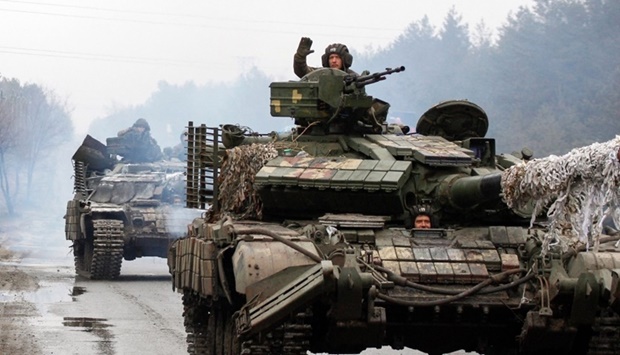Ukrainian forces fought off Russian troops in the capital Kyiv on Friday on the second day of a conflict that has claimed dozens of lives, as the EU approved sanctions targeting President Vladimir Putin.
Small arms fire and explosions were heard in the city's northern district of Obolonsky as what appeared to be an advance party of Russia's invasion force left a trail of destruction.Russian President Vladimir Putin has defied Western warnings to unleash a full-scale invasion on Thursday that displaced at least 100,000 people and prompted condemnation from around the world.
Following pre-dawn blasts in Kyiv, Ukrainian President Volodymyr Zelensky recalled Nazi Germany's 1941 invasion and praised his people for "demonstrating heroism" as Russian forces advanced towards the capital.
The president called on Europeans with "combat experience" to take arms and defend Ukraine, saying the West was too slow to help his country.
Russian Foreign Minister Sergei Lavrov meanwhile said Moscow wanted to "free Ukraine from oppression" and denied there had been any strikes on civilian targets.
He said Moscow was ready to talk if Ukraine's armed forces "lay down their arms", adding that "nobody intends to occupy Ukraine".
Russia has demanded that Ukraine to drop its ambition to join NATO.
In the Obolonsky district, AFP saw a dead man in civilian clothes lying sprawled on the pavement and, nearby, medics rushed to help another man whose car was crushed under the tracks of an armoured vehicle.
In contrast, the city centre felt like a ghost town.
Intersections around the government district were manned by green armoured vehicles and machine-gun toting soldiers in balaclavas.
Sirens wailed over the cloudy city at jarring intervals throughout the day. Booms of unexplained origin echoed across the deserted streets.
Russian forces first arrived on the outskirts of Kyiv on Thursday when helicopter-borne troops assaulted an airfield just outside the city, close to Obolonsky.
The Ukrainian defence ministry told civilians to resist.
"We urge citizens to inform us of troop movements, to make Molotov cocktails, and neutralise the enemy," it said.
Ukraine said 137 people, including soldiers and civilians, have been killed since Russia began its air and ground assault on Thursday.
In the Ukrainian village of Starognativka near the frontline where separatists have faced off against Kyiv's forces for years, official Volodymyr Veselkin said the settlement had come under attack with missiles.
"They are trying to wipe the village off the face of the earth," he said.
The UN's refugee agency has said that at least 100,000 people already been displaced inside Ukraine, while thousands of others fled across the border.
Streams of people in cars and on foot were seen crossing into Hungary, Poland and Romania and hundreds camped out in a train station in the Polish border city of Przemysl.
In Kyiv, many residents fled their homes and took shelter in the city's subway system.
Zelensky said on Thursday there was now a "new iron curtain" between Russia and the rest of the world, adding later that his nation had been "left alone".
"Who is ready to fight alongside us? I don't see anyone."
While the United States moved to impose sanctions on Russian elites and banks, it stressed that American forces would not fight in Ukraine.
NATO also said it would not send forces to Ukraine.
Among the highest-profile strategic developments on Thursday, Ukraine said Russian forces had seized the Chernobyl nuclear power plant -- prompting concern from international nuclear watchdogs.
Ukrainian officials said Friday that radiation levels had increased in the Chernobyl exclusion zone and warned the capture of the plant by Russian soldiers could have "terrible consequences".
Russia said Thursday it had destroyed over 70 Ukrainian military targets, including 11 airfields.
Western intelligence confirmed Moscow had established "complete air superiority" over Ukraine.
Weeks of diplomacy failed to deter Putin, who massed over 150,000 troops on Ukraine's borders.
Western allies had initially imposed some sanctions on Russia in an effort to stop Putin from invading, then followed through on Thursday with vows to heavily punish Russia economically.
US President Joe Biden announced export controls against Russia, alongside sanctions on Russian elites he called "corrupt billionaires", and banks.
He will meet Friday with fellow NATO leaders in an extraordinary virtual summit to discuss the security situation in and around Ukraine.
The EU also moved to impose "massive" sanctions on Russia's energy and finance sectors on Thursday.
EU officials on Friday said the bloc had agreed go even further by freezing European assets linked to Putin and Lavrov personally.
There was also a raft of sanctions in the cultural and sporting worlds, with UEFA deciding that Paris will host this season's Champions League final instead of Saint Petersburg.
Formula One also said it was cancelling the Russian Grand Prix while remaining World Cup skiing events were scrapped by the sport's governing body FIS.
A rare voice of support for Moscow came from the Myanmar junta which said Russia's invasion of Ukraine was "justified", while Syrian President Bashar al-Assad praised the invasion, saying it was a "correction of history".
Putin announced the start of the invasion in a pre-dawn announcement on Thursday, justifying it as a defence of the self-proclaimed Donetsk and Lugansk republics in eastern Ukraine.
The leaders of the two separatist territories had asked Moscow for military help against Kyiv after Putin recognised their independence on Monday.
Russia has repeatedly accused Ukraine's Western-backed government of discriminating against the Russian-speaking population in the east of the country.
A conflict between the separatists and government forces has dragged on since 2014, killing more than 14,000 people.

